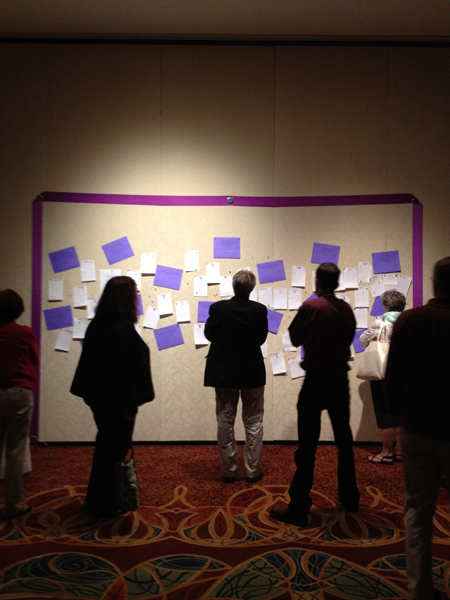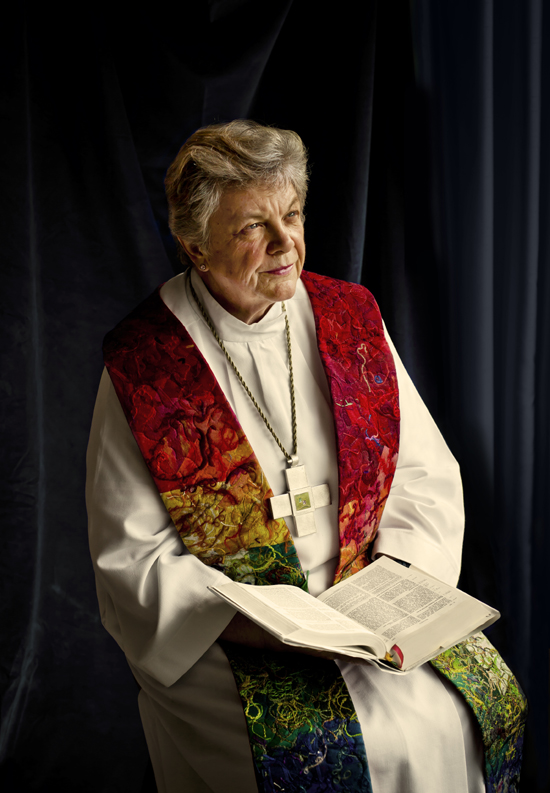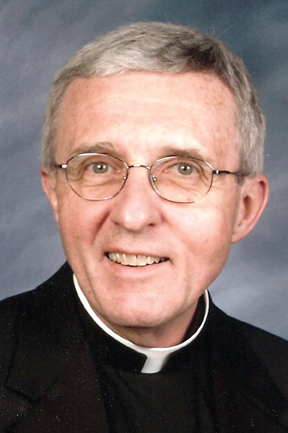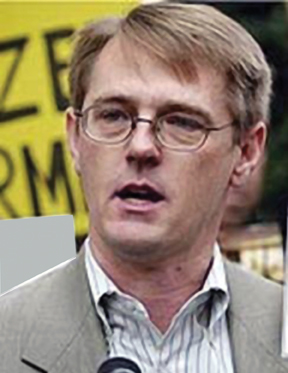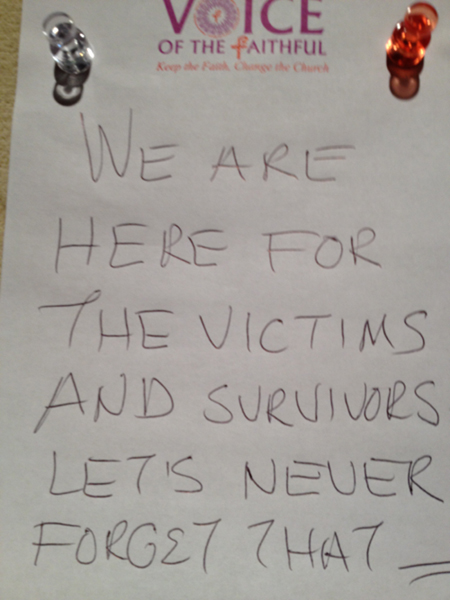We hear from attendees and speakers who look back at VOTF’s beginnings and ahead to its future. Suffice it to say, VOTF has found its voice.
Rev. James Connell, pastor of Holy Name of Jesus and St. Clement Parishes in Sheboygan, Wisconsin, a canon lawyer who advocates on behalf of victims/survivors of clergy sexual abuse of minors.
Illinois Supreme Court Justice Anne Burke, a longtime children’s advocate.
BOSTON – “Why aren’t the bishops here tonight?” a voice in the ballroom called out.
“They were invited,” replied the master of ceremonies with a shrug. “We didn’t get a terribly negative response, but – they’re not here.”
Bishops who are not there – in so many senses of the phrase. That was a recurring theme of the 10th anniversary Voice of the Faithful conference in September.
With the exception of Blessed Pope John XXIII, to whom the conference was dedicated, and Milan’s recently departed Cardinal Carlo Maria Montini, who was applauded for admitting that the Church is “200 years out of date,” a number one speaker called a gross underestimate, the hierarchy took it on the chin for everything from their financial opacity and obstructionism to their obsession with “pelvic zone issues” and liturgical rubrics, down to their baroque ceremonial garb.
The event drew about 450 people to the Marriott Boston Copley Place Hotel, barely a dozen miles from where Voice of the Faithful began with listening sessions in a church basement in Wellesley. The organization’s membership now numbers 30,000 worldwide. “I wouldn’t still be a Catholic if it weren’t for Voice of the Faithful,” said one attendee who was sure she spoke for many.
Judging from the sea of gray hair, and by doing a quick bit of math, one was reminded that the conferees had come of age 50 years ago, as Vatican II shook the ground, a formative event that still powerfully reverberates for them, no matter that Rome pretends it didn’t happen.
“I’d like to see the Church change so I don’t have to leave it, that’s all,” said Bud Roche, a retiree from Needham, MA, and Florida during the opening cocktail party. “It’s asinine a woman can’t become a priest. A woman can’t even become a deacon. Take a look at the nuns, what they’re doing to them. I’ll tell you, if someone put together a deal, a Catholic Church of America, I’d run there, and I tell you, half the women I know would run there, and a lot of nuns would run there.”
Roche and his wife Eileen are Republicans, but liberal-minded when it comes to Church reform. Pope John Paul III “wiped out” Vatican II, “and now they’re making him a saint! Naming parishes after him in Boston! Insane.”
A short documentary film about Voice of the Faithful’s beginnings illustrated how steep the learning curve was for those brave souls challenging their Church for the first time. One interviewee drew chuckles when she recalled having thought, “Oh, wouldn’t Cardinal Law love to know!” that the laity was willing to pitch in and help fix the crisis.
The conference speakers – a roster of progressive Catholic authors and activists – did not so much make presentations as raise battle cries.
“Pride, untruths, protecting the institution at all costs and treating the laity like serfs – have we learned no lessons in a decade?” said Anne Burke, an Illinois Supreme Court justice and former chair of the United States Conference of Catholic Bishops National Review Board, in an opening address. “We have no interest in returning to the way the Church of our youth was led, the church of cover-up, secrets and hidden crime.”
Another speaker, David Clohessy, executive director of Survivors Network of those Abused by Priests, called on Catholics to stop giving money to all Catholic institutions, including to their parishes. Such donations, he said, only build the “power, reputations, prestige and war chests of Church officials,” with the cash used to hire defense lawyers, PR firms and lobbyists to fight sexual abuse claims. When people tell him that they don’t want to hurt lay employees, Clohessy says he replies: imagine if, during the civil rights movement, people refused to boycott so as not to deprive bus drivers of jobs.
“Get over that,” he said.
This was just the kind of incendiary challenge which Voice of the Faithful might have cringed at in its early days, as the organization sought to distinguish itself from such church-reform groups as Call to Action.
Pat McSweeney, who was passing out brochures at the Call to Action table in the exhibits room, was an early member of both. She recalls attending one of the Wellesley meetings – even before Voice of the Faithful had a name – and mentioning Call to Action as a model.
“I could feel people around the table stiffen. Their perception was that it was too radical,” she said, in its advocacy of optional celibacy and the ordination of women. “And I could tell from some subsequent meetings that Voice of the Faithful people were intent on sympathizing with the victims and with supporting the priests of integrity, but they didn’t want to ruffle the feathers of the bishops or change the Church, particularly.
“Now I’m here ten years later and I could hear from the talks that were given last night that Voice of the Faithful has evolved and they’ve realized it’s up to them, the laity, to make the changes that need to be made, to bring healing and honesty and integrity to the Church.”
Several times over the two days, different speakers said reforms may not happen “in our lifetime.” Nonetheless, attendees say they have evolved so far beyond their previous “pay, pray and obey” approach to Catholicism that they “could never go back.”
Voice of the Faithful now lists shaping structural change among its goals, specifically in the areas of priestly celibacy, women’s ordination, clericalism, and lack of lay input into decisions about, for instance, the selection of bishops.
In answer to a question about why more priests aren’t involved in Church reform, speaker Rev. Donald Cozzens, author of several books calling for Church reform, blamed priests’ immaturity. But “perhaps we are maturing and finding our adult voice,” he said.
“We priests are vassals to our bishop. The vassal’s primary virtue is loyalty and we priests need to talk about what real loyalty is. It should be to the gospel.” Toward the end of the conference, attention turned toward the absence of young people from both Voice of the Faithful and the Church, and what to do about it.
Sarah Politano, of Wisconsin, a student at Harvard Divinity School, said during a break that she practically has to decide anew every day to stay Catholic. “Especially after learning how widespread the coverup was … it’s easy to feel exhausted already, and I’m only 25. I can’t imagine people who’ve spent their lives wrestling with these issues.” That they continue to do so, she said, is “inspiring.”
Several speakers said there’s little older Catholics can do but show by example how essential their faith is to them.
As Jamie Manson, a young columnist for the National Catholic Reporter, put it: “Name what’s meaningful about being Catholic … what treasures of Catholicism are worth rescuing from the burning building that is the institutional Church.”
Unlike in her grandparents’ day, when religion was woven into other aspects of community life, and people’s lives unalterably prescribed for them (marriage, children, husband working, wife at home), Manson said the lives of today’s young adults follow a more individualistic model.
“Community doesn’t tell young people today what they believe, what their values are, what their morality is. That kind of individuality is really unprecedented,” she said, and its impact on the Church cannot be overstated.
“Today’s young adults experience a Church that was tainted from the very beginning,” she said, and for which they feel “no nostalgia…They’d rather distance themselves from Church authority than spend time and energy trying to change it.”
Sure, whenever the Pope travels, the media focuses on hordes of ecstatic young people, but these are “highly orthodox” believers, for whom the Church is a refuge from such social changes as women’s equality and gay rights– “young folks who are afraid of the world.”
To reach better-adjusted youth, Manson advises speaking to their interest in social justice, on “God working through us sacramentally” to help the “poor and broken.”
“With our without the hierarchy, with or without our priests, with or without our parishes – honor what’s good and true and beautiful about the Catholic tradition.”
As members of Voice of the Faithful, she said, “the risks you took to speak life-saving truth to a religious behemoth has been an important model for young adults to grow up with.” She credited the organization with making possible the sexual-abuse prevention training, background checks and policies and procedures that were eventually implemented.
“On behalf of young adults who have benefited from your work and who will be in a safer, more accountable Church because of you, I say, happy anniversary!”
These photos show the “Lamentation Wall” at the conference, where attendees could post their sentiments.
